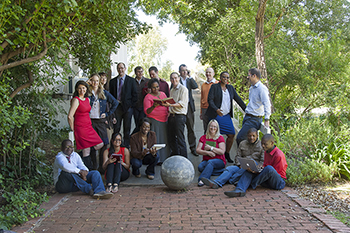Latest News Archive
Please select Category, Year, and then Month to display items
03 October 2024
|
Story Ansie Barnard
|
Photo Supplied
 From left to right: Londeka Mkhwanazi, Semither Mkhize, Salima van Schalkwyk, Slindokuhle Ndlovu, Asanda Mpinga, Mantombi Molefe, Ntombinkulu Khumalo, Mosebjadi Chauke and Thembinkosi Mkhwanazi.
From left to right: Londeka Mkhwanazi, Semither Mkhize, Salima van Schalkwyk, Slindokuhle Ndlovu, Asanda Mpinga, Mantombi Molefe, Ntombinkulu Khumalo, Mosebjadi Chauke and Thembinkosi Mkhwanazi.
The Amrut Foundation, in partnership with the University of the Free State (UFS), successfully hosted its Inaugural Innovathon at the UFS Qwaqwa Campus. This competition is designed to identify and support innovative products and services that not only generate profit but also contribute to the public good, with a strong emphasis on ethical business practices. Through this collaboration, students gain national exposure for their businesses and receive support to create sustainable social enterprises.
Five teams of student social entrepreneurs from the Qwaqwa campus were shortlisted to participate in the regional finals. Their selection was based on ventures that adhered to a social entrepreneurship model and demonstrated plans for long-term profitability and sustainability.
During the Innovathon, a panel of judges from the UFS, the Amrut Foundation, and the Small Enterprise Development Agency (SEDA) selected two outstanding teams to represent the UFS at the national finals, which will take place in October. The winning ventures, Biofly-Pro and Root Rescue were each awarded R20,000 to further develop and expand their initiatives.
Hemang Desai, Executive Director of the Amrut Foundation, expressed his enthusiasm for the event: "Amrut is proud to co-host the Free State leg of the inaugural Innovation Challenge with the UFS. Supporting students with entrepreneurial ambitions that align with societal care is one of our key focus areas."
Dr Grey Magaiza, Senior Lecturer and Deputy Director for the Centre for Gender and Africa Studies at the UFS, highlighted the importance of social entrepreneurship: “Social entrepreneurship is a collaborative effort towards creating sustainable and ethical business processes. The two winning projects embody these principles, and we look forward to their continued growth. In line with our Vision 130, social entrepreneurship can serve as a critical lever for university-community engagement.”
Congratulations to Biofly-Pro and Root Rescue on their well-deserved achievements!
Prestige Scholars Programme invests in promising academics
2015-06-24

Photo: Sonia Small |
Whilst many academics find it challenging to have sustainable funding for specific projects, it is often just as challenging to find relevant exposure and good mentorship programmes to fully prepare academics toward becoming full professors.
Prof Jonathan Jansen, Vice-Chancellor and Rector of the UFS, designed the Vice-Chancellor’s Prestige Scholars Programme (PSP) specifically targeting newly-completed post-doctoral students who are already members of the academic staff.
The goal is to select the most promising young scholars and to make substantial institutional investment in their development.
To date, the PSP has produced 2 Fulbright scholars; 10 National Research Foundation (NRF) rated scholars; 1 NRF Blue Skies research project and 14 NRF Thuthuka-funded projects. These scholars work with the best academics at leading universities on three continents.
Prof Jackie du Toit, co-director of the programme, explains that while the PSP does not provide funding, it is a great programme to empower scholars by means of assistance towards generating funding from outside sources.
Prof Du Toit co-directs this programme with Proff Corli Witthuhn, Vice-Rector: Research and Niel Roos from the Department of Africa Studies.
“The PSP bases its approach to funding on the philosophy that young scholars are to be encouraged towards financial independence, based on a viable postdoctoral project that would sustain their scholarship for five to eight years post PhD. We believe that the cachet and long-term sustainability of existing funding programmes such as Fulbright outweighs the short-term benefits of automatic funding from the PSP. We also endeavour to teach young scholars to work cleverly within institutional parameters, rather than leave them floundering once they step off the active PSP.”